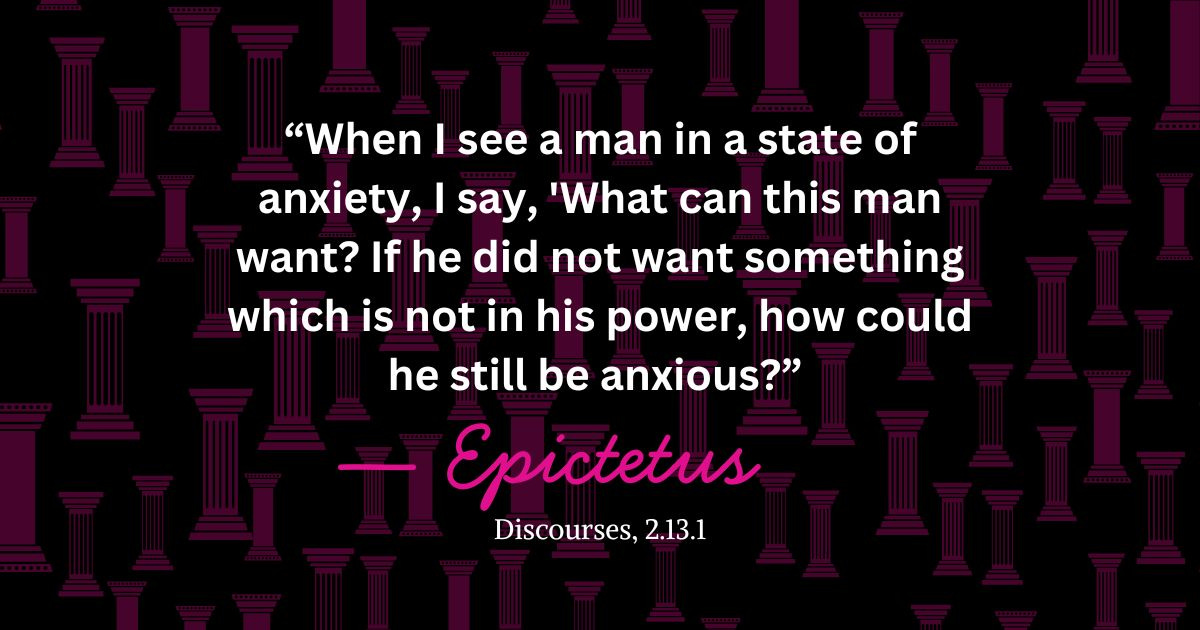What Control Is Not: What Stoic Women Need to Know to Stay Chill in a Chaotic World
We often talk about how control causes us to suffer and what control is and what it looks like in all parts of our lives. This week, we discuss what control is NOT.
Hey girl,
I have to confess: I have a thing… with time. Not time itself, but the fantasy version of it. The version where I magically get everything done, check every box, make something green for dinner, and read something profound before bed. And despite all my schedule-hacking, list-making, and mental pep talks… that version of time? 100% does not exist.
So really, what I have a thing with is control.
That’s the real confession. Each day, I structure and plan with good intentions. And still, there are many times, by the end of it, I’m wiped. Not from what I did, but from the mental labor of catching my reflexes, taking deep breath breaks, and asking myself through clenched teeth: “What is mine to control?”
But here’s the part I need you to know: this isn’t where I started.
A few years ago, I gripped everything. Without pause or self-questioning. I lived on autopilot. My grip switch was on default.
I was unpleasant.
Snappy.
Unpleasantly snappy.
Then I carried guilt to bed, wondering if I was screwing everything up and just feeling bad for the way I showed up for myself and everyone else. Next day, rinse, wash, repeat.
Now?
I still feel the tension, but here’s the difference: I notice it quicker, and I recover a hell of a lot faster. I mean, some grips have even vanished altogether. The superficial ones, at least. And while there are still some tugs of control that try to pull me, I don’t go under like I used to.
This is what practice does.
Yet what no one really says when you’re learning a new way to live, or trying to build discipline: practice doesn’t mean you don’t still feel tension. Or some sort of discomfort. It doesn’t erase the waves. But what it does do is teach you how to swim when they come.
That’s where Stoicism has been my anchor. It didn’t “fix” me. It freed me from being enslaved to illusions. To emotions that trigger reactions I was not proud of. It has given me clarity to transform those knee-jerk reactions into responses that reflect who I am. But most importantly, who I want to be for the ones I love. And with continued practice, my relationship with control will continue to shift. Continue to soften.
The theme of control is one of the core tenets of Stoic philosophy: Focus only on what’s yours. Release what isn’t. Over the years, I’ve written a lot about this.
We’ve explored how control shows up in:
Perfectionism and fear of making mistakes, and
The ache of trying to rewrite the past and self-punishment
We’ve explored what it means and also how to let go.
But this week? I want to offer something different. Something we haven't explored yet: what control is NOT.
Because it doesn’t always rear its head in obvious ways.
Sometimes it hides beneath the mask of care. Or safety. Or even peace.
But if you can name what it isn’t, you just might create a little more space to breathe. A little more room for some behavior-shifting clarity.
Ancient Wisdom
One of the most sobering truths I’ve learned comes from Epictetus—a Stoic philosopher born into slavery, later freed, who spent his life teaching others how to master the only thing we ever truly control: ourselves.
At the heart of his teachings is this: control doesn’t begin with what we do. It begins with what we desire.
And when that desire is driven by fear, anxiety, or the need to feel safe, we don’t act from wisdom.
We react from survival.
That’s what hooked me. Because at one point, I was constantly reacting from survival, and it wrecked my nervous system. My anxiety was relentless. I was pouring energy into things outside my power and losing touch with the one place I actually held strength: my mind. The part of me that could think clearly, judge wisely, and respond intentionally, even when everything else felt out of control.
It wasn’t just one quote that shifted things for me—it was the rhythm of Epictetus’ reminders. A rhythm of thought I go back to time after time:
When I’m feeling overwhelmed, angry, or on edge, I pause and ask: What am I trying to control right now? Nine times out of ten, it’s something outside my power.
To the Stoics, control stems from misplaced desire. It shows up as urgency, tension, and false certainty. It distracts you from your real task: to be present, principled, and rooted in what’s yours to carry.
But here’s what you won’t find explicitly in those ancient texts, and not because the philosophy is flawed, but because it reflects its era. Although the Stoics gave us brilliant tools, they didn’t account for how control shows up through different lived experiences, especially for women.
In their writings, control was usually framed as a desire: a hunger for pride, power struggles, or guarding identity through status.
But desire has more than one face. And when you put it on a scale, it often tilts differently for women.
For men, it often serves power.
For us? It serves protection, safety, belonging, peace.
We don’t control to dominate. We control to hold things together. To manage others’ emotions while burying our own. To preempt the fallout before it begins. To shield ourselves and everyone else. Sometimes, even under the thought that we’ll be the ones cleaning up the mess, so we need to take the upper hand right now.
So while the Stoics told us control is not performance, I’d like to add: control is not security, either.
Modern Truth
In the context of your life, what this means is… if you’re anything like me, you don’t always feel like you’re trying to control things. Or at least not with poor intentions or from a malicious place.
Let’s be honest, most women don’t walk around thinking “I’m controlling.”
We think we’re managing. Holding it down. Keeping the wheels turning. And if nothing is going as planned, then it feels like we failed. Either ourselves or someone else.
Somewhere deep down inside, I think we picked up this false notion that control = calm.
Quiet.
No drama.
And promises us somewhere in there, right next to love, we will also find security. That our relationships will always be protected. That everyone around us will flourish side by side. That we will never be alone. And no one, including us, will want for anything again.
And we all live happily ever after. The end.
But here’s a truth we often don’t learn until we’re exhausted: control isn’t the absence of chaos.
It isn’t how you soothe your soul.
And it’s definitely not the path to peace.
Real peace? It’s not cultivated by getting everything to go your way. It’s forged in the fire. It’s built through emotional endurance by facing the very realities you’ve been trying to outrun.
Here’s another truth you don’t learn right away either: surrender doesn’t mean giving up. It means shifting your energy from resistance to resilience.
And YES, both paths—gripping and letting go, control and surrender—are hard!
But if you begin each day, each new relationship, each new task, each new life stage, by remembering that life was never meant to be chaos-free, then maybe…
When the unexpected shows up… When you're tempted to hand your new partner a list of rules instead of sharing your boundaries… When this chapter isn’t what it was cracked up to be…
You’ll choose differently.
You’ll choose the path that teaches you how to swim with the rip currents, not against them.
Live Your PhilosoShe™ (Turning Wisdom Into Action)
These exercises are designed to help you shift from reaction to response. Bridging the gap from knowing to doing. Not overnight—but one intentional move at a time, toward clarity, calm, and command.
They’re inspired by the idea that a fulfilled life balances three wins: physical, mental, and spiritual. Each type of practice reflects that:
Keep reading with a 7-day free trial
Subscribe to PhilosoShe™ Weekly by Stoic Dahlia to keep reading this post and get 7 days of free access to the full post archives.








